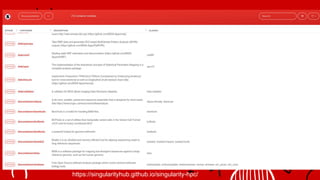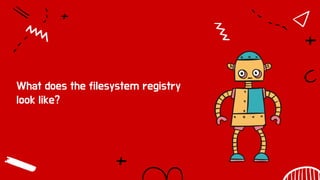Singularity Registry HPC
- 1. Singularity Registry HPC Collaborative Container Modules Vanessa Sochat PhD Computer Scientist Lawrence Livermore National Lab
- 2. A formula for collaboration? Identify an actual need that crosses communities
- 4. How do we provide containers? The Problem: ● Public registries (Docker Hub, Quay.io) or self deployed (Singularity Registry Server, Docker Registry) ● Each user separately pulling means a lot of redundancy ● Pulling “latest” means we aren’t aware of versioning ● It’s not impossible to be reproducible, but it’s harder, and best practices are hard to follow!
- 5. How do we provide containers? ● HPC admins can provide a shared collection of containers ● Users could also install a collection, if not provided by an admin ● It’s done so in a way so that using the containers is reproducible. Ideally:
- 6. A formula for collaboration? Identify an actual need that crosses communities Have an idea that fits into a current way of thinking
- 8. Hmm 🤔
- 9. Hmm 🤔
- 10. What is wrong with current solutions? ● Not easy enough to collaborate on ● Not modular enough ● Not enough granularity in defining container versions or interactions
- 11. Reproducibility 01 Define exact tags and digests to install and load.
- 12. Reproducibility 01 Define exact tags and digests to install and load. Ease of use 02 Install, load, and use. I don’t want to know it’s a container!
- 13. Reproducibility 01 Define exact tags and digests to install and load. Ease of use 02 Install, load, and use. I don’t want to know it’s a container! Abstraction 03 I largely don’t want to be aware that I’m interacting with containers.
- 14. Reproducibility 01 Define exact tags and digests to install and load. Ease of use 02 Install, load, and use. I don’t want to know it’s a container! Abstraction 03 I largely don’t want to be aware that I’m interacting with containers. Automation 04 Find new container tags and digests for me. Let me check for updates and decide.
- 15. How does it work?
- 16. $ git clone https://github.com/singularityhub/singularity-hpc $ cd singularity-hpc $ pip install -e . $ which shpc
- 17. $ git clone https://github.com/singularityhub/singularity-hpc $ cd singularity-hpc $ pip install -e . $ which shpc
- 19. https://singularityhub.github.io/singularity-hpc/ biocontainers bids docker spack jupyter nvidia ...
- 21. singularity exec --home ${HOME} --bind ${HOME}/.local:/home/joyvan/.local <container> jupyter notebook --no-browser --port=$(shuf -i 20000-65000) --ip 0.0.0.0 run-notebook I want to run a notebook!
- 22. What does the filesystem registry look like?
- 26. An shpc registry entry
- 27. An shpc registry entry
- 28. An shpc registry entry
- 29. An shpc registry entry
- 30. An shpc registry entry
- 31. An shpc registry entry
- 32. Automated Updates with “Binoc” @alecbcs
- 33. Automated Updates with “Binoc”
- 34. Automated Testing of Containers
- 35. A formula for collaboration? Identify an actual need that crosses communities Have an idea that fits into a current way of thinking Create a contributor friendly learning environment
- 37. A formula for collaboration? Identify an actual need that crosses communities Have an idea that fits into a current way of thinking Create a contributor friendly learning environment
- 38. What do I do now?
- 40. Research Software Engineers National Lab Lenny “We have the biggest supercomputers!” Academic Alicia “We have a research computing team too.” Industry Ignacio “We use cloud services and anywhere we can find GPUs!”
- 41. National Lab Lenny “We have the biggest supercomputers!” Academic Alicia “We have a research computing team too.” Industry Ignacio “We use cloud services and anywhere we can find GPUs!” How do we work together? 🤔
- 45. What are the benefits of collaboration? Why should we work together? ● Collaboration leads to better ideas and approaches. ● Convergence on best practices (behavior and software) for research software engineering ● Learn and grow from one another.
- 46. What are the drawbacks of collaboration? Why shouldn’t we (or can’t we) work together? ● Costs of effort and time. ● Concerns about intellectual property or resulting profits from work ● It requires a security clearance ● I can’t afford it.
- 47. How are we doing?
- 48. LLNL Open Source 1. Identify an actual need that crosses communities → Assess repository state and define statement of need 2. Have an idea for a way to fix it. 3. Create documentation, branding, and tutorials 4. Tell people about it, get them interested.
- 52. How are we doing? ● 765 repos ● 36 % have more external than internal contributors ● 61 % have more internal than external contributors. ● 3 % have equal numbers ● Top ten internal/external contributors has overlap of 1
- 53. How are we doing? 1. We have a few projects that are excelling in attracting external contributors 2. The most “popular” projects at the lab are possibly not contributor friendly. 3. What about the long tail?
- 55. Can we do better? 🤔
- 56. A Plan of Action!
- 57. Contributor CI 1. BASELINE: Collect metrics to measure contributions 2. CFA: Contributor Friendliness Assessment 3. ACTION: Timestamps of proactive action A set of tools and procedures to assess contributions
- 58. A Call to Action!
- 59. Why should I care? - It’s hard to work together across siloed RSE communities. - Let’s look closely at our institutions and get better at that. - Identify software developed in your lab or institution. - Make a assessment of external vs. internal contributions - Contributor Friendliness Assessment - Improve the scores.
- 60. Why should I care? - No established best practice for an HPC registry - Little involvement of RSE/HPC communities with OCI
- 61. What do you think?
- 62. Thank you! @vsoch GitHub and Twitter






























































